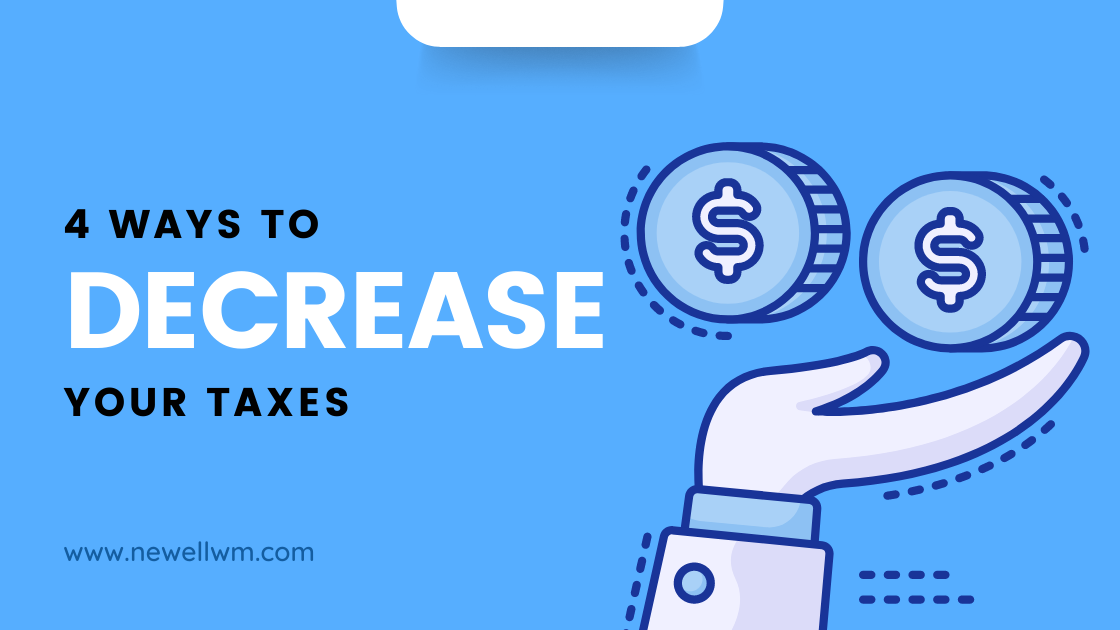4 Ways to Decrease Taxes as a W-2 Employee

“How is it that I make pretty good money, but my take home pay is a lot less than that?” my client said during a recent meeting. “Good question” I told her, as we were going through what type of expenses she should expect throughout retirement. I went on to point out on her pay stub, a good chunk of her income was going towards taxes. To which she nodded, paused for a moment, and asked “is there anything I can do about that?” The answer, of course with many things in financial planning, is yes and no.
Paying taxes is generally a good problem to have, it means, to a certain extent, you are doing well enough for Uncle Sam to think he can take his fair share. With that said though, having worked with hundreds of clients across the spectrum of wealth, nationality, background, culture, political affinity etc., I can count maybe one or two that specifically did not want to find a way to reduce their tax liability.
For employees that would like to bring down their taxes, unfortunately, there are not many strategies available. Some employers though – like The Walt Disney Company, The University of Florida and others I have personally worked with in the past – do offer a few options to contribute to pre-tax vehicles that might bring down your overall all tax liability. Here is a brief overview of some of those options:
1. Employer retirement plan: This is the most obvious and widely used that I see. With the Walt Disney Company, this is going to be the 401(k) that is offered, while the University of Florida for instance has the Optional Retirement Plan, the 403(b) TSA (tax sheltered annuity) and in some cases a 457 plan as well. If one does not have access to an employer plan, there may still be an option to do an Individual Retirement Account (IRA). Each of these vehicles have their respective limited amount of funds that can be put in per year but generally those contributions can be made on a pre-tax basis. Meaning, for every dollar you add to the plan, that is one less dollar of taxable income this year. This usually means, however, that when you take the funds out, there may be taxes due at that time.
2. Healthcare Flexible Spending Account: This is a type of account that can be set up to pay for healthcare expenses throughout the year. This is a pre-tax contribution, so it can reduce your taxable income. A caveat with this though, is to be careful with how much you fund this type of account because any money not used does not carry over to the next year. A good benefit of this type of account, is if the funds in this account are used on qualified expenses, then they come out without tax as well.
3. Dependent Care Flexible Spending Account: If you have little ones up to the age of 13, this is an account that you can fund on a pre-tax basis to help cover dependent care related expenses, like before and after school care and summer day camps. While this is still your money being spent on these items, as most companies I have seen do not contribute to these, since it is pre-tax, it gives your wallet a little break while you enjoy a break from the kiddos. When used on qualified expenses, the money is not taxed on the way out too!
4. Health Savings Account: For financial planning purposes, this is by far one of my favorite accounts available out there but very seldom used in my experience. A difference of this type of account and the Flexible Spending Account is that money in the Health Savings Account can roll-over each year! The benefits of this really deserves its own article, but to remain succinct, this is a different type of account to contribute on a pre-tax basis. The caveat with this though is you do have to participate in a high-deductible plan, which carries all its own considerations before making any decisions there.
There are other rules, pros and cons to pay attention to with each plan that is more detailed than can be gone through in this format. These decisions are always best discussed based on your personal situation.
I hope this helps you when trying to find ways to maximize your pre-tax contributions.
Important Information
Newell Wealth Management, LLC (“NWM”) is a registered investment advisor offering advisory services in the State of FL and in other jurisdictions where exempted. Registration does not imply a certain level of skill or training. The presence of this website on the Internet shall not be directly or indirectly interpreted as a solicitation of investment advisory services to persons of another jurisdiction unless otherwise permitted by statute. Follow-up or individualized responses to consumers in a particular state by NWM in the rendering of personalized investment advice for compensation shall not be made without our first complying with jurisdiction requirements or pursuant an applicable state exemption.
All written content on this site is for information purposes only and is not intended to provide specific advice or recommendations for any individual. Opinions expressed herein are solely those of NWM, unless otherwise specifically cited. Kyle Newell and NWM are neither an attorney nor an accountant, and no portion of this website content should be interpreted as legal, accounting or tax advice. Material presented is believed to be from reliable sources and no representations are made by our firm as to other parties’ informational accuracy or completeness. There is no assurance that the views or strategies discussed are suitable for all investors or will yield positive outcomes. Investment involves risks including possible loss of principal and unless otherwise stated, are not guaranteed. Any economic forecasts set forth may not develop as predicted and are subject to change. All information or ideas provided should be discussed in detail with an advisor, accountant or legal counsel prior to implementation.
